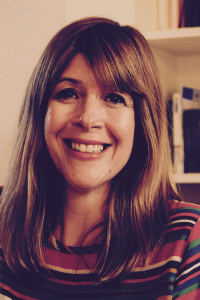
Your ALCS: what your Board does for you
In 2018, a mere 1.6% of ALCS members voted in the ALCS Board election. With this year’s election on the horizon, we’re aiming to encourage more of you to vote by giving you insights into the work of the Board. This month we speak to Non-Executive Directors, Faye Bird and Michael Ridpath.
 Faye and Michael have both been Non-Executive Directors of the ALCS Board since 2017. Faye is the author of two Young Adult novels – My Second Life and What I Couldn’t Tell You. Before becoming a writer, she worked in television for over ten years as a literary agent at The Agency (London) Limited and Talkback Management representing scriptwriters in drama, children’s TV and comedy.
Faye and Michael have both been Non-Executive Directors of the ALCS Board since 2017. Faye is the author of two Young Adult novels – My Second Life and What I Couldn’t Tell You. Before becoming a writer, she worked in television for over ten years as a literary agent at The Agency (London) Limited and Talkback Management representing scriptwriters in drama, children’s TV and comedy.
Prior to becoming a full-time author, Michael worked for a bank and a venture capital company in the City of London. He has written 15 novels: eight financial thrillers, four Icelandic crime novels, two spy novels and a stand-alone thriller, Amnesia.
Currently chaired by children’s author Tony Bradman, the ALCS Board is made up of an additional eight Non-Executive Directors plus one executive member – Owen Atkinson. Three Non-Executives were co-opted for their experience within the audiovisual, digital and financial sectors, and the other five were elected by the ALCS membership. Each Board member also sits on two sub-committees, which consist of Nominations, Finance & Audit, Remuneration, Distribution & Membership and Lobbying.
What made you want to become an ALCS Board member?
Michael: I am a former treasurer of the Royal Literary Fund, and over the years I frequently discussed investment issues with the executive of ALCS, so I had come to know the organisation well. I was asked to join as a co-opted member and was pleased to accept.
Faye: I care about writers being paid fairly for the work they do. Writers should, without question, fully and fairly reap the rewards that follow from the exploitation of their written works. Copyright enables writers to do just that. ALCS both supports copyright and exploits diverse sources of income for writers through the principle of a collective. It has an important and valuable role in the life of writers. When I was asked whether I might be interested in a co-opted position on the Board, given my previous experience as a literary agent representing audiovisual writers, there was no question that I wanted to put myself forward.
The Board establishes the overall values behind the strategic plan.
Why is the Board important to ALCS members? How helpful is it that each Board member is a practising writer?
Michael: Firstly, writers understand what is important to the members of ALCS. Secondly, writers can ensure that ALCS remains true to its purpose and doesn’t become one of those bodies that exists solely for its own good.
ALCS was set up by writers for the benefit of writers and now distributes over £30 million of income annually amongst its 100,000 writer members. A Board made up of writers ensures that it will continue to operate on this basis.
Faye: The value of having a Non-Executive Board made up entirely of practising writers is that each Board member brings with them their own knowledge and experience of sectors of the writing industries they work in. The fact that writers sit on the Board should give members confidence that decisions made at Board level are first and foremost for the benefit of writers – because that’s what we all are.
What are the personal rewards of being a Board member? Would you recommend the job?
Michael: As a full-time writer, the Director’s fee of nearly £10,000 pa is welcome. And because ALCS is such a worthwhile organisation, it feels good to help often hard-up writers to receive income due to them. Lastly, my ALCS work is a welcome change to sitting at a desk alone, typing!
Being a Board member is not for everyone, but I would recommend it to those writers who like the sound of the advantages I have mentioned, and don’t mind putting in the work.
Faye: I greatly enjoy the work I do at ALCS. I have met some brilliant and interesting people, learnt new things and gained new insights. It’s great to work collaboratively. The work often provides a welcome opportunity to be more social and step away from the writing desk. I value being part of the work and part of the team too!
What sort of time commitment does being on the ALCS Board entail?
Faye: There are regular Board and Committee meetings throughout the year and, of course, the AGM. There are papers to read ahead of each of those meetings. In between I receive emails in relation to on-going business, and I also attend events in order to support ALCS work throughout the year, for example in relation to literacy charities and writing awards, or around lobbying.
Michael: In addition to Board and Committee meetings, there are occasional ALCS events around the country, and opportunities to meet the staff. Over time, I am getting to know more of them.
All decisions that are made by the Board directly impact ALCS members, given that our work is entirely focused on collecting and paying out money to members as efficiently and successfully as possible.
ALCS has a three-year strategic plan – what is the role of the Board in developing this?
Michael: The Board establishes the overall values behind the strategic plan; this time we wanted ALCS to strengthen its core competencies, rather than strike out into new areas. Non-Executive Board members also suggested and approved specific ideas, although most of these come from the Executive.
Faye: ALCS obviously needs to be able to respond to on-going technological, economic and political change as best it can when looking ahead at future strategy, and so looking back and looking forward together as a Board, and sharing our range of knowledge and experience is a crucial part of this. The strategic plan needs to be approved by the whole Board before it is published, and then the work begins!
Name some of the things the Board has achieved recently that directly impacted ALCS members.
Faye: All decisions that are made by the Board directly impact ALCS members, given that our work is entirely focused on collecting and paying out money to members as efficiently and successfully as possible, as directed by collective management organisation (CMO) regulations. This work has meant that members can now make claims for visual works. We have also been lobbying hard in relation to the EU Copyright Directive. And ALCS commissioned a report (carried out by CREATe) into authors’ earnings, based on a survey of over 5,000 writers. This is undoubtedly an important piece of research that will drive the conversation around authors’ pay.
Why is it important for ALCS members to vote in Board elections?
Michael: ALCS has always prided itself on being an organisation run by writers for writers. For this to work, we need our membership to elect board members. This can be a challenge. In last year’s election only 1,600 people out of 99,000 voted. We need more than that. If you value the money you receive from ALCS, we would appreciate you taking the time to vote in the election.
Faye: As a member of ALCS I think it’s important to know who is representing your interests at Board level. By voting in the elections every member can be assured that the Non-Executive Directors on the Board are members who have a genuine interest in the future of ALCS, who have something that they feel they can contribute to the organisation and, crucially, in the best interests of all.
If you’re interested in standing for election to the ALCS Board, then do get in touch to find out more about the nominations process.
The election will be run in October of this year with the results being announced at the Annual General Meeting on 28 November so keep an eye out for correspondence from the Electoral Reform Services (ERS) then.
